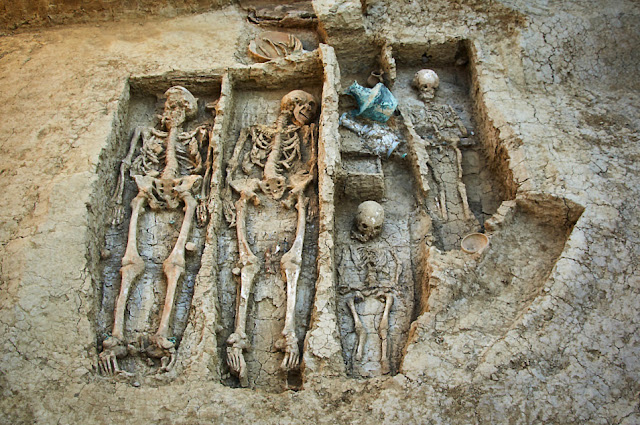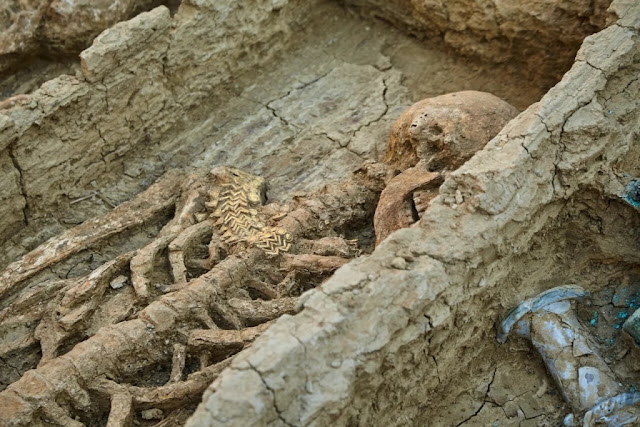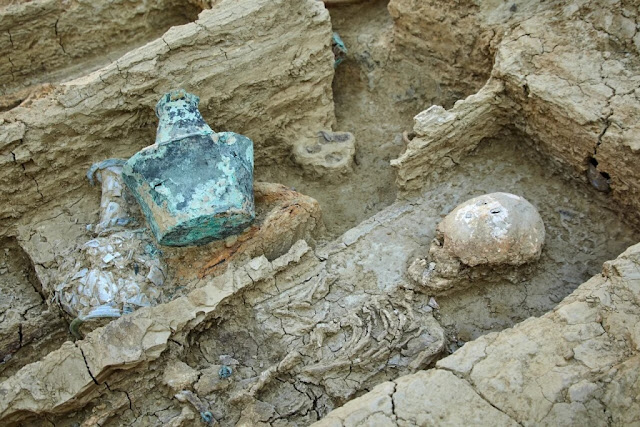Archaeologists have uncovered the 1,500-year-old crypt of a warrior who was buried with his wife and children in an ancient city, according to reports.
The remains were found in the eastern necropolis at Phanagoria—a coastal settlement founded by the Ancient Greeks located in what is now the Krasnodar Krai administrative region of Russia on the shores of the Black Sea.
Researchers say that the warrior was likely of high status because he and his family were buried more than 16 feet below the ground alongside a trove of valuable items, Ruptly reported. It is estimated that the remains date back to the 5th century A.D.
An ancient warrior from a noble family was unearthed buried in a 1,500-year-old Russian crypt with his wife and three children.

“In these graves we can see the remains of a family: an adult man—a warrior and a horseman—his wife and three children,” Aleksei Voroshilov, head of the Necropolis division at the Institute of Archeology of the Russian Academy of Sciences, said.
“Judging by what we have found here the man was served the city’s army. He was a horseman, because we found riding stirrups and spurs too,” he said. “There is also a leather harness attached to a belt which was used to carry a sword. The buckles on the harness are really worn-out which means this warrior has seen a lot of fighting. He was unsheathing and sheathing his sword again and again.”
Voroshilov and his team say that the warrior and his family may have been killed during an attack by nomadic tribes or died as a result of plague.
The discovery was made under somewhat fortuitous circumstances given that the team was about wrap up their excavations at Phanagoria when they unearthed the warrior’s remains.
The crypt is not the only interesting find that the researchers made this summer at the site. For example, the team discovered a marble tabletop which could have been used as an altar in a church, indicating that Christianity was present in Phanagoria in the fifth century.
Furthermore, another marble artifact found at the site—a sunken receptacle used for child baptisms—suggests that Phanagoria was the birthplace of the religion in Russia, according to Vladimir Kuznetsov, head of the Phanagoria open-air museum.
“One of our underwater expeditions discovered a ship some time ago, which was sunk following the uprising in Phanagoria against Mithridates VI of Pontus which occured exactly in 62 B.C. This ship is one of the most ancient one ever found in the world,” Kuznetsov said.
Experts believe the family may have died from the plague or were butchered by Nomadic tribes.
Researchers say that the depth of the burial – 16 feet (five metres) underground – as well as valuables found alongside them, suggest their wealthy status.
‘Judging by what we have found here the man was served the city’s army,’ Aleksei Voroshilov, head of the Necropolis division at the Phanagoria archaeological dig, told Russian news site Ruptly.


‘He was a horseman because we found riding stirrups and spurs too. There is also a leather harness attached to a belt which was used to carry a sword.
‘The buckles on the harness are really worn-out which means this warrior has seen a lot of fighting. He was unsheathing and sheathing his sword again and again.’
Around 250 people took part in this year’s archaeological dig at Phanagoria, including student volunteers and experts from France and Bulgaria.
Several other artefacts have been found, both in the Phanagoria and in flooded parts of the ancient city.
Researchers say the finds are of interest to scientists globally, as they are unique in the world.
‘This year we have discovered very accurate and strong evidence that Christianity was founded in Phanagoria in the fifth century, which is a marble tabletop, which could be used as an altar in a church.
‘We have discovered a marble baptistery for infants or probably for toddlers as well. It is not very big, nevertheless, it is massive and made from marble.’
‘One of our underwater expeditions discovered a ship some time ago, which was sunk following the uprising in Phanagoria against Mithridates VI of Pontus which occurred exactly in 62 BC.
‘This ship is one of the most ancient ones ever found in the world.’
Phangoria was founded in the mid-sixth century B.C. by Greek settlers who were largely fleeing conflict in Asia Minor—where modern-day Turkey is located—The Vintage News reported. The settlement eventually developed into the most influential city in the Black Sea area and one of the largest greek metropolises before being abandoned in the 9th and 10th centuries due to unknown reasons.



